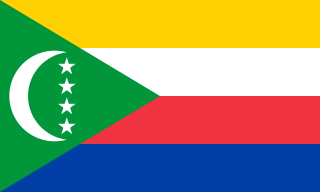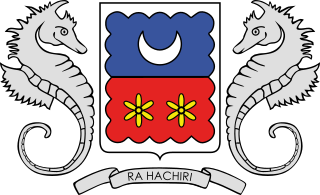 |
|---|
|
Parliamentary elections were held in the Comoros on 22 March 1987. The result was a victory for the Comorian Union for Progress, the sole legal party, which won all 42 seats in the first round of voting. Voter turnout was around 65%. [1]
 |
|---|
|
Parliamentary elections were held in the Comoros on 22 March 1987. The result was a victory for the Comorian Union for Progress, the sole legal party, which won all 42 seats in the first round of voting. Voter turnout was around 65%. [1]
There were 42 constituencies (increased from 38), each of which elected a single member: 20 on Grande Comore, 16 on Anjouan and 6 on Mohéli. [1]
| Party | Seats | +/– | |
|---|---|---|---|
| Comorian Union for Progress | 42 | +5 | |
| Others | 0 | –1 | |
| Total | 42 | +4 | |
| Source: IPU | |||

The Comoros, officially the Union of the Comoros, is an archipelagic country made up of three islands in Southeastern Africa, located at the northern end of the Mozambique Channel in the Indian Ocean. Its capital and largest city is Moroni. The religion of the majority of the population, and the official state religion, is Sunni Islam. Comoros proclaimed its independence from France on 6 July 1975. The Comoros is the only country of the Arab League which is entirely in the Southern Hemisphere. It is a member state of the African Union, the Organisation internationale de la Francophonie, the Organisation of Islamic Co-operation, and the Indian Ocean Commission. The country has three official languages: Shikomori, French and Arabic.
The history of the Comoros extends back to about 800–1000 AD when the archipelago was first inhabited. The Comoros have been inhabited by various groups and sultanates throughout this time. France colonised the islands in the 19th century, and they became independent in 1975.

The Politics of the Union of the Comoros take place in a framework of a unitary presidential republic, whereby the President of the Comoros is both head of state and head of government, and of a multi-party system. Executive power is exercised by the government. Legislative power is vested in both the government and parliament. The precolonial legacies of the sultanates linger while the political situation in Comoros has been extremely fluid since the country's independence in 1975, subject to the volatility of coups and political insurrection.

Mayotte, officially the Department of Mayotte, is an overseas department and region and single territorial collectivity of France. It is one of the overseas departments of France as well as one of the 18 regions of France, with the same status as the departments of Metropolitan France. It is an outermost region of the European Union and, as an overseas department of France, part of the eurozone.

Anjouan is an autonomous volcanic island in the Comoro Islands in the southwestern Indian Ocean, part of the Union of the Comoros. It is known in Shikomori as Ndzuani, Ndzuwani or Nzwani, and, until the early twentieth century when the name fell out of general use, in English as Johanna. Historically it was also called Hinzuan or Hanzoan.

Elections in the Comoros take place within the framework of a multi-party democracy and a presidential system. The President and the majority of the seats in the Assembly of the Union are directly elected.

The unicameral Assembly of the Union of the Comoros is the country's legislative body. It was established in 2004.
The Comorian Union for Progress is a political party in the Comoros.

Parliamentary elections were held in the Comoros on 8 and 15 December 1978, following the adoption of a new constitution in a referendum in October. All candidates ran as independents. Following the elections, Salim Ben Ali was appointed Prime Minister on 22 December, and a government was formed on 28 December.

Parliamentary elections were held in the Comoros on 7 March 1982, following the early dissolution of the Federal Assembly by President Ahmed Abdallah on 25 January. There were 38 constituencies, each of which elected a single member. In February the Comorian Union for Progress had been created as the sole legal party, and its candidates won 37 of the 38 seats.

Parliamentary elections were held in the Comoros on 22 November 1992, with a second round on 29 November 1992. Due to electoral irregularities in the initial elections, there were also by-elections in six of the 42 constituencies on 13 and 20 December.

Early parliamentary elections were held in the Comoros on 12 December 1993, with a second round in all but four seats on 20 December. The elections were held after President Said Mohamed Djohar dissolved the Federal Assembly elected in November 1992.

Parliamentary elections were held in the Comoros on 1 December 1996, with a second round in six seats on 8 December. The result was a victory for the National Rally for Development, which won 36 of the 43 seats, some of them uncontested. In addition to independent candidates, the only other party to run was the National Front for Justice following a boycott by several parties in protest at the lack of an independent electoral commission and revision of the electoral registers. Voter turnout was very low, at around 20%.

Parliamentary elections were held in the Comoros on 25 January 2015, alongside local elections. A second round of voting was held on 22 February in the 21 constituencies where no candidate won in the first round. The Union for the Development of the Comoros emerged as the largest party, winning eight of the 24 seats in the Assembly of the Union.
Events in the year 2015 in the Comoros.

The Islands' Fraternity and Unity Party is a political party in the Comoros.

The National Rally for Development was a political party in the Comoros.

The Union of Democrats for Development was a political party in the Comoros led by Ibrahim Halidi. Based on Anjouan, it was supportive of the government of President Said Mohamed Djohar.

The Rally for Democracy and Renewal is a political party in the Comoros.

Parliamentary elections were held in the Comoros on 19 January 2020; in constituencies where no candidate received a majority, a second round was held alongside local elections on 23 February. The elections were boycotted by the main opposition parties, including the two largest parties in the outgoing Assembly, the Union for the Development of the Comoros and Juwa Party, in protest at constitutional reform and political repression, The result was a landslide victory for President Azali Assoumani's Convention for the Renewal of the Comoros, which won 20 of the 24 elected seats.